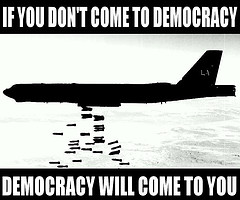In denial
/ iran's aryan fans /Iranian president Mahmud Ahmadinejad (his
site) has recently proved without a doubt that he lacks basic political skills, to a degree I never thought possible for a leader of such a huge country. His recent "
Holocaust conference", is an affair of such astounding stupidity and ignorance that, were it not a fact that he is pretty much under the command of the (ruthless yet) rather more intelligent religious leadership, might be really bloody scary - if only because of the childishness that this whole matter indicates residing in the upper levels of a powerful country.
As Norman Markowitz notes in a recent
article in Political Affairs magazine:
If I were a conspiracy theorist, which I am not, I would say that Mahmoud Ahmadinejad, Iran's far right president, was an agent provocateur of the Bush administration, working to isolate his country from the civilized world and set the stage for a military attack on it. Ahmadinejad seems to think that the best way to advance himself is to seek alliances with open fascists throughout the world while distracting his own people's attention from the high unemployment and inflation that they face, posing as the defender of the Palestinian people and the enemy of the U.S. and the Israeli governments.
In fact, as Markowitz concludes:
Actually Ahmadinejad has helped Bush more than if he were an agent. He has on his own given the Bush administration a propaganda victory against his country that millions of CIA dollars could not have accomplished. If he continues on this path he may even top Saddam Hussein as a paragon of political wisdom.
Alternatively, inviting a former Grand Wizard of the Ku Klux Klan (among other similar illuminaries) as a panelist, might indeed indicate that the man is truly a racist and a fascist, in which case it would be nice if someone would ask his theologically erudite superiors if they consider racism and nazi ideology compatible with Islam.
Despite the regime making
an effort to exclude from the conference, participants who were in a position to dispute the holocaust denialists, there was a host of reactions from the Arab and Muslim world. Especially worthy of note is the open letter of
Mahmoud Al-Safadi, in Le Monde (original in French), who is a
PFLP member, recently released from an Israeli prison, where he was locked up for 18 years for throwing molotov cocktails (no, really). In it he decries Ahmadinejad's conference and holocaust denial, stating among other things that:
...Whatever the number of victims -- Jewish and non-Jewish -- the crime is monumental. Any attempt to deny it deprives the denier of his own humanity and sends him immediately to the side of torturers. Whoever denies the fact that this human disaster really took place should not be astonished that others deny the sufferings and persecutions inflicted on his own people by tyrannical leaders or foreign occupiers...
...Concerning the struggle of my people for their independence and their freedom: perhaps do you regard the negation of the Holocaust as an expression of support for the Palestinians? There, again, you are mistaken. We fight for our existence and our rights and against the historical injustice which was inflicted on us in 1948. We will not win our victory and our independence by denying the genocide perpetrated against the Jewish people, even though the forces who occupy our country today and dispossess us are part of the Jewish people...
[
Translation: MRZine]
Similar condemnation comes from the
Muslim American Society:
...President Ahmedinejad should recognize that the issue of the Palestinian people must not, and cannot, be transmogrified into the ugly and spiritually bankrupt context of racial hatred. The cause of freedom must never drink from the well of hatred and racism...
Finally, Fawwaz Traboulsi, writing in the Beirut daily as-Safir of 14 December 2006 has
much to comment on, regarding the regional contradictions of holocaust denial:
...How can we ever hope to make a convincing contribution to the unmasking of the "Holocaust industry" if we deny Nazi crimes against the Jews? How can we ever hope to draw attention to the crimes of the "new Nazis" against the Palestinian people if we decrease the number of victims of the historical Nazis? What is the significance of making comparisons between Nazism and Zionism, in order to denounce the latter, if we also exonerate the Nazis of their greatest historical crime, which is the Holocaust? And is this not the mirror image of what the Zionists have done when they appropriate the role of victims and deny the Palestinians of even claiming they are victims?...
The apologetics for Nazi Germany, are not acceptable. The reality of the holocaust and the colossal human toll of the Nazi hordes in all of Europe, is only denied by committed fascists and assorted nuts. In aligning himself with the global extreme-right, Ahmadinejad reveals his utter cluelessness. At the same time he is providing the New Colonialists with more fodder for their spin machines.
Thankfully, things aren't going too well for him
on the electoral front, recently.

